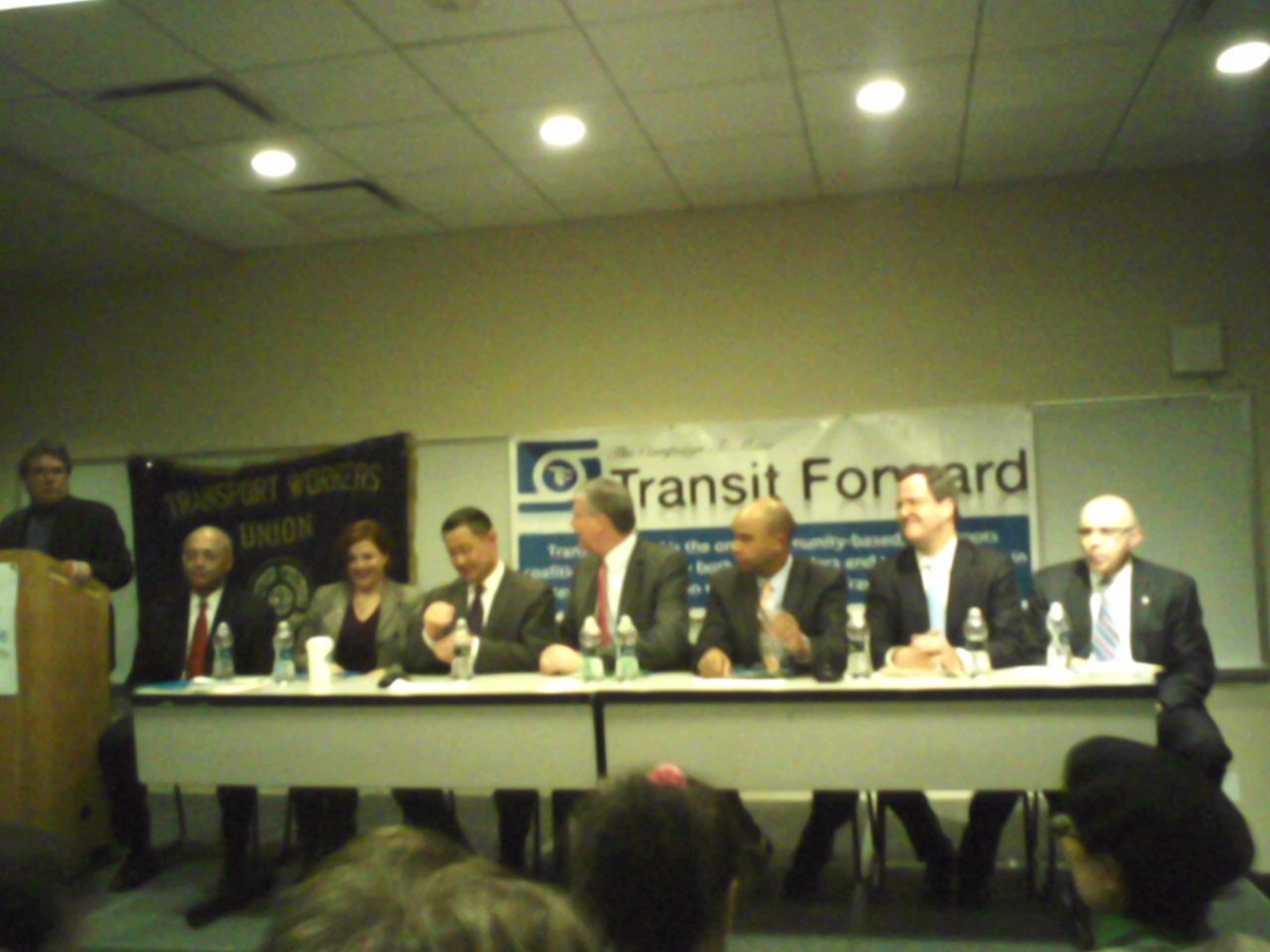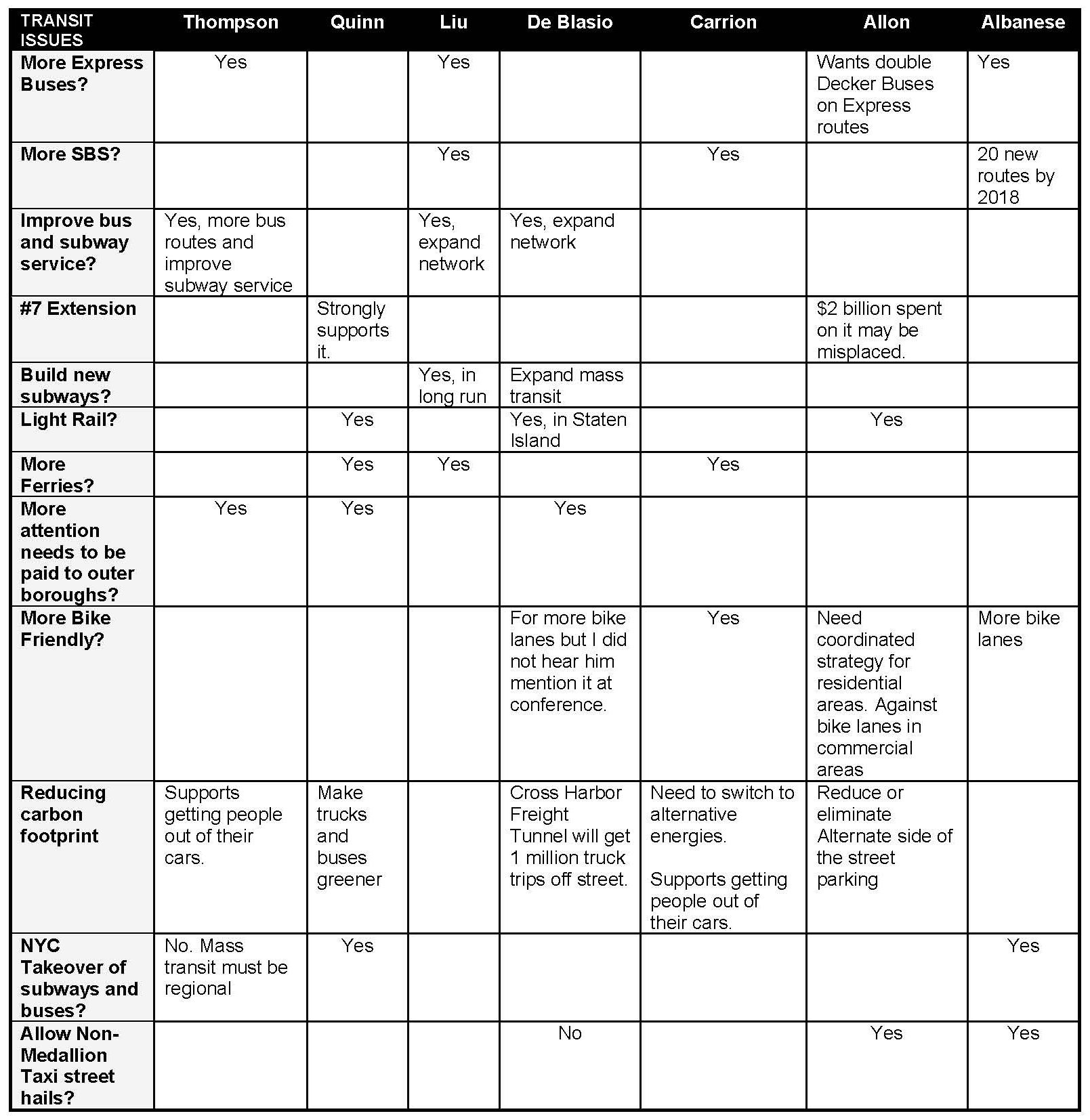Mayoral Candidates Square Off On The Future Of Transportation – Part 1 of 3

THE COMMUTE: Last Friday I attended a discussion held at the City University of New York with mayoral hopefuls Sal Albanese, Tom Allon, Adolpho Carrion (Allon and Carrion are both seeking the Republican nomination), Bill de Blasio, John Liu, Christine Quinn, and Bill Thompson all in attendance. Former MTA Chairman Joe Lhota, also seeking the Republican nomination, was not in attendance. The big question is: Why? This article sheds some light why he was not present.
The candidates answered most of the questions rather than sideswiping the issues, as we all too often see in political debates. One exception was the very first question about groping attacks on women in which the candidates used their time to make their opening remarks instead. The other questions asked of the panel were:
- Is there a correlation between the 2010 service cuts and the rise in incidents of employee assaults?
- New York City currently funds mass transit with .2 percent of its budget. As mayor, would you increase that funding amount to one percent?
- How would you reduce New York City’s carbon footprint?
There was a greater interest in improving and expanding bus service than subway service. Three candidates were in favor of building light rail and only Liu mentioned expanding the subway system in the long term. There was also much interest in ferries and the need to pay more attention to the outer boroughs.
Questions were asked by the moderator, the TWU and Noah Budnick of Transportation Alternatives. Budnick stated that a poll showed that most people think the mayor controls the subways and buses, most city residents work in the same borough in which they live, and job growth is greater in the outer-boroughs.

During the course of the discussion the following issues listed on the scorecard (to the right) were raised. You can click on it to see a snapshot of their views on many issues.
Other Significant Transit Issues
Panelists did not specify if they favored more express buses coming into Manhattan or if they were in favor of new express routes between other boroughs, something I’ve always favored, which the MTA seems to oppose because they do not operate any.
Albanese stated that the MTA is not accountable.
Allon made a fundamental error stating that taxis are mass transit when, in fact, they are public transit. There is a difference. He also stated that the MTA is a Tri-State agency, which is a little misleading, because only Metro-North has lines that enter other states. All the other services the MTA operates are entirely within New York State.
Allon also stated that Eliot Spitzer warned us for 10 years about the possibility of a major storm and we did nothing, stating we need to be proactive rather than reactive. He also expressed concerns about the safety of bicycle riders with the proposed City Bike Share program and recommended the city sell more taxi medallions.
Carrion stated that 85 percent of federal transit money presently goes to funding highways but did not offer what an appropriate percentage would be. He merely implied that mass transit deserves more. Carrion also stated that the Bronx needs better east-west transportation, comparing the Cross Bronx Expressway to a parking lot.
De Blasio wants increased G train service. He criticized the MTA for initially opposing the conversion of the temporary G extension to Church Avenue during the Culver viaduct overhaul into a permanent change, even after it was proven to be a success.
Liu stated that people need good transit to be able to get to work and that we should be increasing bus service in areas such as Maspeth where there is natural job growth and where jobs are being created without subsidies. He claimed that bus schedules are unrealistic and not related to traffic.
Quinn stated that we need better transit for the middle class and must create economic opportunity. Other than one mention of light rail, she mentioned the need for more ferries at least three times as the key to improving mass transit.
Thompson stated that we must recognize the importance of mass transit by keeping its infrastructure in a state of good repair, and that it also need to be more affordable. He emphasized that every union contract will expire this year and is a ticking time bomb for the next mayor. He was the only candidate to mention the need to reduce the numbers of trips requiring multiple buses.
In Part 2 (on Wednesday): A commentary and summary of the funding issues that were discussed.
The Commute is a weekly feature highlighting news and information about the city’s mass transit system and transportation infrastructure. It is written by Allan Rosen, a Manhattan Beach resident and former Director of MTA/NYC Transit Bus Planning (1981).
Disclaimer: The above is an opinion column and may not represent the thoughts or position of Sheepshead Bites. Based upon their expertise in their respective fields, our columnists are responsible for fact-checking their own work, and their submissions are edited only for length, grammar and clarity. If you would like to submit an opinion piece or become a regularly featured contributor, please e-mail nberke [at] sheepsheadbites [dot] com.



